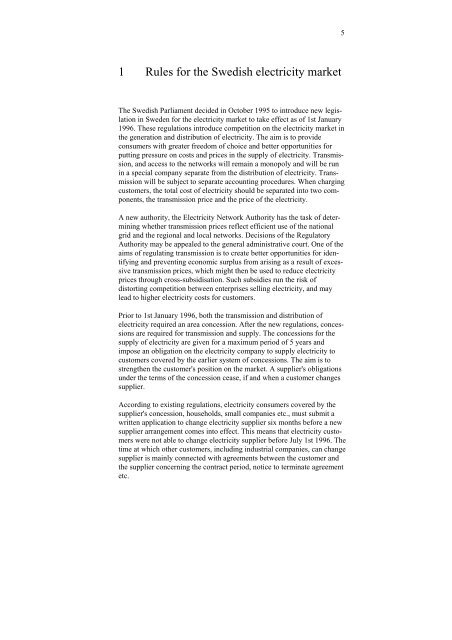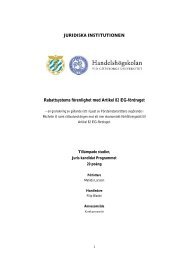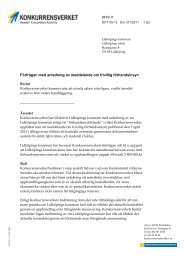Report 1996:3, Deregulation of the Swedish Electricity Market
Report 1996:3, Deregulation of the Swedish Electricity Market
Report 1996:3, Deregulation of the Swedish Electricity Market
You also want an ePaper? Increase the reach of your titles
YUMPU automatically turns print PDFs into web optimized ePapers that Google loves.
1 Rules for <strong>the</strong> <strong>Swedish</strong> electricity market<br />
The <strong>Swedish</strong> Parliament decided in October 1995 to introduce new legislation<br />
in Sweden for <strong>the</strong> electricity market to take effect as <strong>of</strong> 1st January<br />
<strong>1996</strong>. These regulations introduce competition on <strong>the</strong> electricity market in<br />
<strong>the</strong> generation and distribution <strong>of</strong> electricity. The aim is to provide<br />
consumers with greater freedom <strong>of</strong> choice and better opportunities for<br />
putting pressure on costs and prices in <strong>the</strong> supply <strong>of</strong> electricity. Transmission,<br />
and access to <strong>the</strong> networks will remain a monopoly and will be run<br />
in a special company separate from <strong>the</strong> distribution <strong>of</strong> electricity. Transmission<br />
will be subject to separate accounting procedures. When charging<br />
customers, <strong>the</strong> total cost <strong>of</strong> electricity should be separated into two components,<br />
<strong>the</strong> transmission price and <strong>the</strong> price <strong>of</strong> <strong>the</strong> electricity.<br />
A new authority, <strong>the</strong> <strong>Electricity</strong> Network Authority has <strong>the</strong> task <strong>of</strong> determining<br />
whe<strong>the</strong>r transmission prices reflect efficient use <strong>of</strong> <strong>the</strong> national<br />
grid and <strong>the</strong> regional and local networks. Decisions <strong>of</strong> <strong>the</strong> Regulatory<br />
Authority may be appealed to <strong>the</strong> general administrative court. One <strong>of</strong> <strong>the</strong><br />
aims <strong>of</strong> regulating transmission is to create better opportunities for identifying<br />
and preventing economic surplus from arising as a result <strong>of</strong> excessive<br />
transmission prices, which might <strong>the</strong>n be used to reduce electricity<br />
prices through cross-subsidisation. Such subsidies run <strong>the</strong> risk <strong>of</strong><br />
distorting competition between enterprises selling electricity, and may<br />
lead to higher electricity costs for customers.<br />
Prior to 1st January <strong>1996</strong>, both <strong>the</strong> transmission and distribution <strong>of</strong><br />
electricity required an area concession. After <strong>the</strong> new regulations, concessions<br />
are required for transmission and supply. The concessions for <strong>the</strong><br />
supply <strong>of</strong> electricity are given for a maximum period <strong>of</strong> 5 years and<br />
impose an obligation on <strong>the</strong> electricity company to supply electricity to<br />
customers covered by <strong>the</strong> earlier system <strong>of</strong> concessions. The aim is to<br />
streng<strong>the</strong>n <strong>the</strong> customer's position on <strong>the</strong> market. A supplier's obligations<br />
under <strong>the</strong> terms <strong>of</strong> <strong>the</strong> concession cease, if and when a customer changes<br />
supplier.<br />
According to existing regulations, electricity consumers covered by <strong>the</strong><br />
supplier's concession, households, small companies etc., must submit a<br />
written application to change electricity supplier six months before a new<br />
supplier arrangement comes into effect. This means that electricity customers<br />
were not able to change electricity supplier before July 1st <strong>1996</strong>. The<br />
time at which o<strong>the</strong>r customers, including industrial companies, can change<br />
supplier is mainly connected with agreements between <strong>the</strong> customer and<br />
<strong>the</strong> supplier concerning <strong>the</strong> contract period, notice to terminate agreement<br />
etc.<br />
5
















